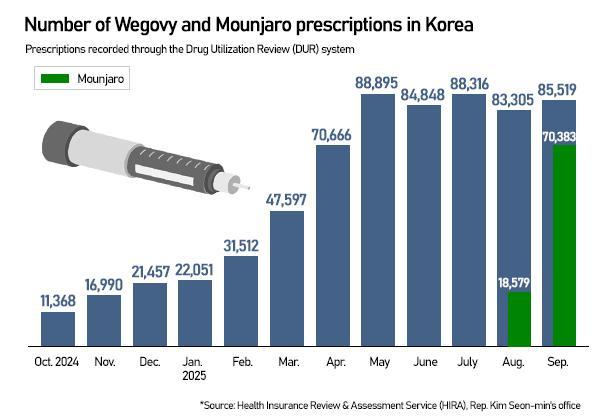
SEOUL, October 15 (AJP) - Easier access and a wider range of options are fueling misuse of foreign-made weight-loss injections in diet-obsessed Korea amid lax regulations and aggressive marketing by clinics and drugstores.
Originally designed strictly for obesity treatment, the costly injections have become easier and cheaper to obtain since Eli Lilly's Mounjaro entered the Korean market in August as a lower-priced alternative to Novo Nordisk's Wegovy.
Interest in Wegovy skyrocketed earlier this year after Bang Si-hyuk, the chubby chairman of HYBE, appeared to have shed a significant amount of weight within months, reportedly with the help of the injection. But the fad has since shifted from treating obesity to serving as a quick diet tool.
"I wasn't questioned for my intention or any health problem. The doctor just wrote away the prescription," said Oh Eun-ji, a 50-year-old woman who easily received a prescription for two monthly kits of 1.0-mg doses from a local clinic, despite not being overweight.
Social media and telemedicine platforms have further accelerated demand. DoctorNow, a telemedicine and prescription app, connects users to hospitals with Wegovy and Mounjaro in stock and provides real-time consultations. Prices vary widely — while clinics often charge 500,000 to 600,000 won ($422) for a monthly kit of Wegovy, it can be found for nearly half the price elsewhere.

Competition has also fueled explosive market growth. According to this year's Drug Utilization Review (DUR) data, prescriptions for Mounjaro reached 70,383 cases, closing in on Wegovy's 85,519. Within just ten days of its August debut, Mounjaro logged 18,579 DUR checks, surpassing Wegovy's first-month record. The drug, Korea's first dual GIP/GLP-1 receptor agonist, quickly gained traction after clinical results suggested stronger weight-loss efficacy than Wegovy.
Prescriptions are also coming from medical departments unrelated to obesity treatment — including psychiatry (2,453 cases), obstetrics and gynecology (2,247), urology (1,010), ophthalmology (864), dentistry (586), and radiology (104), according to data from the Health Insurance Review and Assessment Service (HIRA).
The surge in use has been accompanied by growing reports of side effects. A total of 151 Wegovy users developed acute pancreatitis, while 961 others experienced complications such as cholelithiasis (560 cases), cholecystitis (143), and acute renal failure (63).
More alarmingly, Wegovy has reportedly been prescribed to children and pregnant women, groups for which the drug is strictly contraindicated. Between October 2024 and August 2025, there were 69 prescriptions for children under 12 and 194 for pregnant women, according to the Ministry of Health and Welfare and HIRA.
The phenomenon has drawn a public warning from the Korean Diabetes Association (KDA). "It is deeply concerning that many young adults are misusing obesity drugs for cosmetic purposes despite having no obesity or metabolic disorders. All medications carry risks of side effects. We urge patients to consult certified obesity or diabetes specialists for safe and appropriate treatment," it said.
Copyright ⓒ Aju Press All rights reserved.



